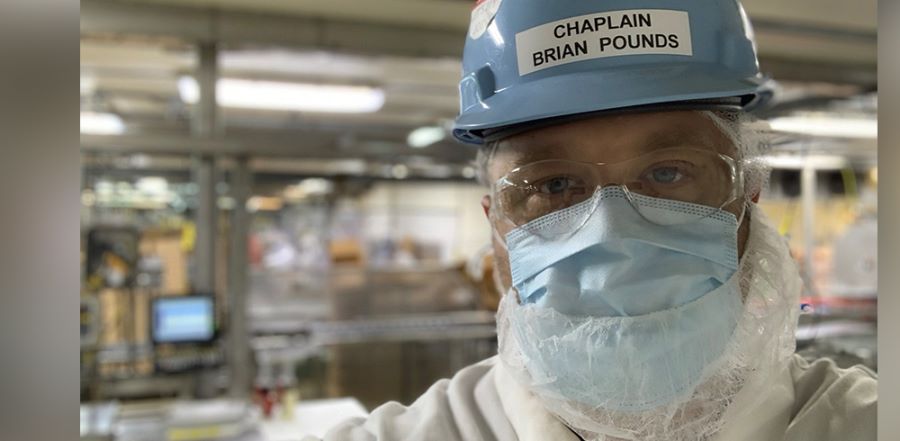On the COVID-19 Front Lines
AG chaplains offer solace and encouragement to meatpacking plant workers.

Assemblies of God chaplains are working in what has become one of the most dangerous places connected with the novel coronavirus: meatpacking plants. Along with nursing homes and penitentiaries, slaughterhouses are among the most contagious sites for contracting COVID-19.
Tyson Foods has 94 marketplace chaplains employed in plants coast to coast. They remain on the front lines, supporting those processing beef, poultry, and pork products.
Board chairman John H. Tyson, 66, started the chaplaincy program in 2000, recognizing the importance of faith representatives in the workplace. Tyson, the nation’s largest seller of meat by volume, has 141,000 employees. Tyson brands include Jimmy Dean, Hillshire Farm, and Ball Park.
Chaplains, half of them full time, are paid by the company. They make themselves available by walking through production areas, break rooms, offices, and hallways.
Melissa K. Brannan is a full-time AG U.S. Missions chaplain at Tyson Foods corporate world headquarters in Springdale, Arkansas. Part of her job is supporting the company’s chaplains in the field.
Brannan has worked at Tyson since 2009. In 2015, she relinquished her private marriage and family therapist practice to go full time. Brannan says because the chaplains are so integrated in the fabric of the company, their counsel is being sought out during the crisis.
“We are still providing support to people who struggle with finances or relationships, child care or education concerns, people talking about the frustrations of life or their career,” says Brannan, 41. The pandemic has amplified the angst many workers felt beforehand coping with life issues, she says.
“A lot of what chaplains are doing is addressing fear and stress,” says Brannan, who notes that Tyson chaplains are offering electronic encouragement and support to each other in an effort to keep from burning out themselves. “We continue to be a listening ear, a calming presence in the midst of an anxious situation. We are evolving as the situation continues to unfold and new needs arise.”
PLANT SAFETY MEASURES
Brannan says one of the most important roles for chaplains now is reinforcing recommended safety measures for front-line workers, especially the need for social distancing to reduce the risk of infection. Those in evisceration production lines typically have stood shoulder to shoulder.
At least half a dozen Tyson workers have died as a result of COVID-19, and hundreds have been infected with the virus. Four of the conglomerate’s plants closed last week because of the spread of the disease.
“Change is certainly constant, but so are our values and our promise to our team members — to give them a safe workplace,” says Morgan Watchous, Tyson Foods communications manager. “We’ll continue to adapt and do all that we can do to protect our people.”
In late April, Tyson started requiring workers to wear company-provided surgical-style face coverings. According to Watchous, the company also has mounted workstation dividers, installed infrared walk-through scanners in food production facilities to detect worker fevers, instituted daily deep cleaning and sanitizing at facilities, and erected plastic barriers in break rooms. In addition, she says Tyson has waived the previously required five-day waiting period for short-term disability benefits, so that employees can receive pay if they have contracted COVID-19.
Tyson has waived the co-pay, co-insurance, and deductible for doctor visits for COVID-19 testing, as well as co-pays for telemedicine appointments. The corporation also has awarded $60 million in bonuses to its 116,000 front-line workers and truck drivers, Watchous says.
LISTENING EAR
Brian K. Pounds is among the AG chaplains on the front lines. Pounds has been a part-time chaplain at the Tyson bacon processing plant in Vernon, Texas, for a little over a year. Lately he has been putting in more than his customary 16-20 hours a week connecting with the 750 laborers at the facility. As with all Tyson chaplains, he is on call around the clock.
“So many aspects of the job haven’t changed,” says Pounds, 44. “I’m just trying to be a compassionate active presence helping people in times of crisis.”
Pounds is walking the floor more frequently than usual, and he makes sure he is available for consultation in the cafeteria during lunch. One of his new additional functions is taking temperatures as employees report for their jobs.
Child care is a new stressor for many workers. With school classes canceled for the semester, he has assisted parents in finding child care agency sites as well as at-home educational materials. Pounds, who has served as pastor of First Assembly of God in Vernon for nine years, also is providing resources to Tyson personnel on how to talk to their children about COVID-19.
Pounds says he has cherished the additional time he has been able to spend with his wife, Amy, and their four school-age children, who are all home during the pandemic. He also says conversing electronically with other Tyson chaplains around the nation has been therapeutic. Regardless of geographic plant location or faith tradition, the chaplains have formed a bond because of the common trauma associated with the novel coronavirus, he says.
Jon H. Millen is a full-time chaplain at the Tyson fresh meat corporate office in Dakota Dunes, South Dakota. Part of his role is devising training for monthly meetings with 16 other regional chaplains. In emails and texts, Millen, 56, is emphasizing the importance of reassuring people to remain calm and to have hope during the crisis.
Millen, who has been a U.S. Missions chaplain for 20 years — the past 4½ years at Tyson — is trying to accentuate the positive, for example, urging contacts to use the lockdown as an opportunity to develop deeper spiritual disciplines.
STAYING IN OPERATION
Meanwhile, Tyson is weighing the balance of keeping workers safe versus supplying food to consumers as a critical infrastructure industry, as deemed by the U.S. government. The company has implemented a coronavirus media resources page, which responds to criticisms.
Two Tyson workers from the Columbus Junction, Iowa, pork plant, and four connected to the Camilla, Georgia, facility have died from coronavirus complications. Last week, Tyson suspended operations at a Washington state beef plant, a chicken processing facility in Tennessee, and pork plants in Iowa and Indiana. The Columbus Junction plant closed for two weeks earlier in April before restarting limited operations.
Tyson isn’t alone in struggling with keeping operations going during the pandemic. Overall, at least 20 meat and food processing workers have died from COVID-19, according to the United Food & Commercial Workers International Union. The temporary shutdown of more than 30 plants in the industry has contributed to a decline in meat output, which industry analysts suspect could lead to grocery store shortages in the near future.
In a full-page advertisement published April 26 in The New York Times and The Washington Post, Tyson board chairman John H. Tyson — grandson of John W. Tyson, who founded the business 85 years ago — warned the food supply chain is vulnerable.
“As pork, beef and chicken plants are being forced to close, even for short periods of time, millions of pounds of meat will disappear from the supply chain.” wrote Tyson. “There will be limited supply of our products available in grocery stores until we are able to reopen our facilities that are currently closed.”
On April 28, President Trump announced plans to invoke the Defense Production Act and sign an executive order to ensure that American consumers don’t face shortages of beef, pork, and poultry.
Under the order, Trump designated plants such as ones operated by Tyson as part of the nation’s critical infrastructure. The president directed the U.S. Department of Agriculture to keep the nation’s meat and poultry processors operating “uninterrupted to the maximum extent possible.”
